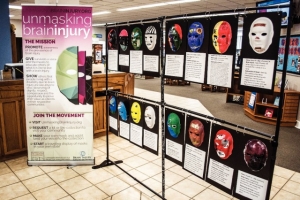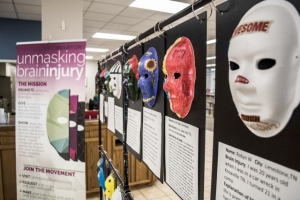Pain behind the masks
By Becky Barclay
Published in News on March 21, 2017 9:57 AM

News-Argus/SETH COMBS
"Unmasking Brain Injury" is a traveling display of masks made by brain injury survivors that's on display at the Wayne County Public Library to bring awareness about those living with a brain injury.

News-Argus/SETH COMBS
A traveling display of masks titled "Unmasking Brain Injury," which was made by brain injury survivors, is on display at the Wayne County Public Library.
Michael O. of Piney Flats, Tenn., was just 9 when he was hit by a dump truck while he and his mother were crossing the street. It caused a brain injury.
He said he was in a dark place after the accident. He had wanted to become a police officer, but that dream was dashed with the accident.
Michael is one of almost 400 brain injury survivors who created masks for a special project, a traveling display titled "Unmasking Brain Injury," part of which is currently on display at the Wayne County Library.
"The project originated at Hinds' Feet Farm in Huntersville, N.C.," said Pier Protz, who works at ReNu Life in Goldsboro, serves on the board of the Brain Injury Association of North Carolina and with the Brain Injury Advisory of North Carolina. Her brother is a brain injury survivor.
"Marty Foil, who is a provider at Hinds' Feet of brain injury rehab services, got the idea from the Wounded Warrior project. Guys with PTSD and brain injuries coming back from Iraq and Afghanistan had this project to help them express their feelings. Foil through it would be perfect for brain injury in general."
The project spread out to brain injury associations in North Carolina, Idaho, Ohio, Michigan and other states and has now become international, Ms. Protz said.
Brain injury survivors everywhere were given the opportunity to decorate a papier mache mask and tell about their injury and what their mask represents.
"It gives survivors the opportunity to have a voice in letting other people know about brain injury," Ms. Protz said. "Some people expressed joy because they have found their new life. But there are many stories of dark sadness here."
Ms. Protz said that a lot of the sadness is born from the brain injury survivor memories of who they were before their accident. And there's so much frustration and even anger at not being able to go back to that life.
The main goal of the "Unmasking Brain Injury" project is to raise awareness of the need for more funding for brain injury survivors to get rehabilitation.
Ms. Protz said that because of the lack of sufficient funding to help them the stimulation and structure they need, may brain injury survivors end up in mental institutions and jail and a lot are even homeless.
She said the proper rehabilitation can help brain injury survivors change their lot in life because it gives them the proper tools to make that change.
"They may not be able to go back to where they were before," she said. "But with stimulation and structure, an individual can change some of their behaviors. They can return to life on a more independent basis."
It can help alleviate some of the despair brain injury survivors go through.
Like Sid from Fuquay-Varina, who was in a car accident on his way home from a party.
His mask has a cross on the forehead and the word "anger" above the eyes. The opening of the eyes contain the words "Jesus is Real." His narrative states that he's "mad because he is alive, and he wishes he was back in heaven with God."
Ms. Protz and Martha Brown co-facilitate a local brain injury support group to help survivors and their families and friends get through this difficult part of their lives.
In its second year now, the group has about 22 coming to the monthly meetings the second Saturday of the month from 10 to 11:30 a.m. at the Peggy Seegars Senior Center.
It's a chance for friends and family to talk to others in the same situation and for survivors just to know that they are not alone.
In addition to meetings, the group takes outings to go bowling, to the pool and even therapeutic horseback riding.
"The support group is not just for them to sit and focus on their story, but to have an opportunity to socialize and do things that anybody does on a regular basis," Ms. Protz said. "And it's there for us to lift each other up and help foster solutions to problems."
Ms. Brown first became involved with brain injury survivors while working as a chaplain at Vidant Medical Center's rehab unit.
"I saw how important it was for them to have support and what a life changing experience it was," she said.
Like Jeff E. from Greenville, who rode his moped drunk, hit a curb, flipped and hit his head on the pavement.
The narrative with his simple red mask states that he feels "angry and ashamed. I am sad about lost relationships and cry a lot."
For more information about the local brain injury support group, call Ms. Protz at 919-394-1091 or email her at piertarrant@renulife.org or call Ms. Brown at 252-481-5679 or email her at encreel@gmail.com.
